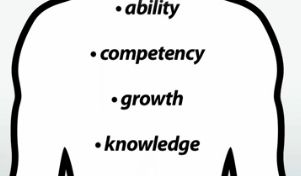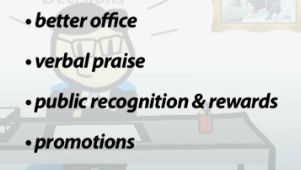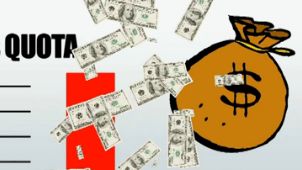Reward Systems & Employee Behavior: Intrinsic & Extrinsic Rewards
After you watch the video and know the material, click HERE for the quiz.
Have you ever wondered why some employees are more motivated than others to work at a higher level of productivity? This lesson explains how managers use intrinsic and extrinsic rewards to reinforce positive employee behavior.
Effective Reward Systems
A motivated workforce can be a significant factor in organizational success. When employees are motivated to work at higher levels of productivity, the organization as a whole runs more efficiently and is more effective at reaching its goals. This is in contrast to an unmotivated workforce, who can negatively disrupt an organization and distract employees from their work. For this reason, it is imperative that managers understand the power of reward systems and how they are used to influence employee behavior.
 |
Intrinsic Rewards
Intrinsic motivation is internal to the person in that it is something that you have to offer yourself and is driven by personal interest or enjoyment in the work itself. Because intrinsic motivation exists within the individual, achieving it does not depend on others. Some people believe that the most powerful rewards come from inside a person.
Think of that sense of accomplishment you feel once you have overcome a significant challenge or completed an assignment or work project that required a good deal of effort. Intrinsic motivation provides that personal pat on the back or natural high that reflects a person's ability, competency, growth, knowledge and self-control over their endeavors. Employees who are intrinsically motivated tend to work at higher levels of productivity and strive to develop professionally. Intrinsic rewards include things such as: personal achievement, professional growth, sense of pleasure and accomplishment.
 |
Intrinsic Rewards in the Workplace
In a knowledge economy where the greatest asset an employee can offer an organization is their intelligence, experience, problem solving ability and change-savvy persona, intrinsic rewards are especially important to workers. In fact, Frederick Herzberg, who is one of the leading theorists of workplace motivation, found intrinsic rewards to be much stronger than financial rewards in increasing employee motivation. This is not to say that employees will not seek financial rewards in addition to intrinsic rewards, rather it just means that money is not enough to maximize motivation in most employees. People want to feel like their contributions matter.
For example, an employee might want to reach a sales quota set by his manager to earn the bonus that is attached to it, but unless the employee feels a sense of accomplishment as part of making those sales, the motivation to achieve the quota is less powerful. To help employees with their intrinsic motivation, managers should:
- provide meaningful work
- allow workers to make choices through a high level of autonomy
- provide opportunities for employees to show their competence in areas of expertise
- facilitate professional development so that employees can expand on their level of knowledge
- offer frequent opportunities for employees to reward themselves
- allow employees the opportunity to connect with those with whom they serve to obtain valuable feedback
- give them a path to monitor their progress with milestones along the way
 |
Extrinsic Rewards
Extrinsic motivation is based on tangible rewards. Unlike intrinsic motivation that is self-administered, extrinsic motivation is external to the individual and is typically offered by a supervisor or manager who holds all the power in relation to when extrinsic rewards are offered and in what amount. Extrinsic rewards are usually financial in nature, such as a raise in salary, a bonus for reaching some quota or paid time off. However, extrinsic rewards can also be as simple as getting the better office, verbal praise, public recognition or awards, promotions and additional responsibility.
These material rewards can be motivating to employees because pay, time off, advancement and recognition are important to most workers. Just imagine how de-motivating it would be to underpaid, overworked and unappreciated, and you can quickly see how important extrinsic rewards are to organizational success. An extrinsically motivated person will work on a task that they do not particularly care for simply because of the anticipated satisfaction that will come from some extrinsic reward. For example, the employee may not be interested in the product he is selling, but reaching the quota means the bonus, therefore he is motivated to put forth the effort he needs to meet the sales quota.
 |
Extrinsic Rewards in the Workplace
Providing employees with extrinsic rewards is relatively straightforward and usually built into performance reviews or individual projects. They are particularly useful in the short-term for motivating employees to work towards one specific organizational goal. Meeting the sales quota for a bonus is an example of offering an extrinsic reward for a short-term goal.
While holding the proverbial carrot in front of the employee's face is certainly a common method of motivating employees, it comes with some important considerations for managers. Managers must be sure to assess employee intent, making certain the increased performance is not only to retain the reward - meaning that it will decline once earned. Effective managers find ways to combine extrinsic rewards with intrinsic ones. Another area that managers must pay special attention to is the long-term feasibility and sustainability of extrinsic rewards. If an extrinsic reward is offered, it must be fulfilled when the employee completes whatever was required to earn the reward in the first place. Budgets change, and if the extrinsic reward is financial in nature, make sure that it can be offered beyond the anticipated distribution date.
 |
Lesson Summary
Let's review. Rewards are positive outcomes that are earned as a result of an employee's performance. There are two general types of rewards that motivate people: intrinsic and extrinsic. Intrinsic motivation is internal to the person and is driven by personal interest or enjoyment in the work itself. Because intrinsic motivation exists within the individual, achieving it does not depend on others. Employees who are intrinsically motivated tend to work at a higher level of productivity and strive to develop professionally. Intrinsic rewards include things such as: personal achievement, professional growth, sense of pleasure and accomplishment.
Extrinsic motivation is based on tangible rewards, is external to the individual and is typically offered by a supervisor or manager. Extrinsic rewards are usually financial in nature, such as a raise in salary, a bonus for reaching some quota or paid time off. However, extrinsic rewards can also be as simple as getting the better office, verbal praise, public recognition and awards, promotions and additional responsibility. An extrinsically motivated person will work on a task that they do not particularly care for simply because of the anticipated satisfaction that will come from the extrinsic reward.
Frederick Herzberg found intrinsic rewards to be much stronger than financial rewards in increasing employee motivation. This is not to say that employees will not seek extrinsic rewards in addition to intrinsic rewards, rather it just means that money is not enough to maximize motivation in most employees. Effective managers find ways to combine extrinsic rewards with intrinsic ones.